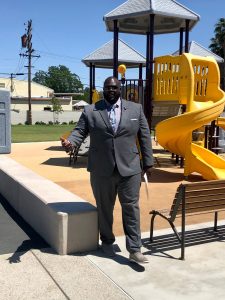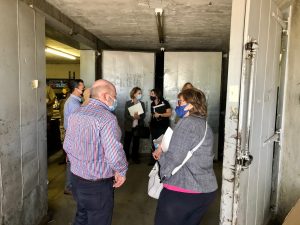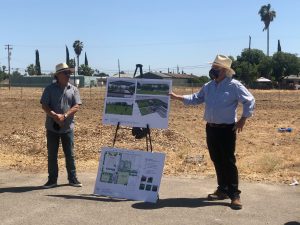Post From Expert Insights

D.J. Criner, Sr. Pastor at St. Rest Baptist Church at the play space behind the newly developed community center. The Southwest Health Hub will be built behind this center and playground.
On May 7th, 2021 local community development, healthcare and other key stakeholders came together to tour the site of the future Southwest Fresno Community Health Hub. The Fresno Community and Economic Development Partnership (CEDP) has exciting plans to create a community-oriented health hub by rehabilitating a 5,852 sq. ft. warehouse that will establish a “Food Hub” to receive, sort, store, and redistribute millions of pounds of healthy food rescued by Food to Share. In addition, they have plans to buy and build on the land adjacent to the warehouse, creating a dynamic hub of activity that will address a whole range of social determinants. Potential components of the SW Fresno Community Health Hub include a health clinic, community kitchen, community owned co-op grocery store, community center, behavioral health services, workforce readiness and training, child care, green spaces, community plaza, gardens, affordable housing, banking services, adult and youth education, and an arts and culture center. Partnering with the CEDP in sharing the overall story were members of Saint Rest Church and Saint Rest EDC, Paul Halajian Architect, Terry Broussard Landscape Architects, Tarlton Construction, Fresno Metro Ministry and Every Neighborhood Partnership.

Healthcare attendees touring the existing food warehouse space that will be rehabilitated to establish a “Food Hub” to redistribute millions of pounds of healthy food rescued by Food to Share.
It was therefore exciting and encouraging to see that this tour included all the healthcare systems and health payors that have a presence in Fresno. This includes: Saint Agnes (part of Trinity Health), Community Regional Medical Center, Valley Children’s Hospital, CalViva, Kaiser Permanente, Anthem, and Adventist Health. The urgency of this moment provides an opportunity to bring these healthcare systems together with community development to co-invest in this Community Health Hub. The engagement of healthcare stakeholders in a spirit of collaboration for this kind of comprehensive strategy marks a new and hopeful trend in the field. Our experience with the COVID-19 pandemic and the emergence of yet another chapter of racial justice activism in the wake of George Floyd’s murder have contributed to a deeper recognition of the profound inequities in our communities. In this context, and given a trend towards risk-based reimbursement, health care leaders see an imperative for greater alignment across sectors, increased scale, and geographic focus in communities where inequities are concentrated.
Fresno County is home to 1.88 million acres of some of the world’s most productive farmland, with agricultural operations covering nearly half of the county’s entire land base of 3.84 million acres. Farmers here raise more than 300 different crops, contributing directly more than $7.7 billion to the California economy and supporting 20 percent of all jobs in the Fresno area.
The SW Fresno neighborhood has always been a unique community with a rich heritage and residents that have deep ties to their community. However, the social and economic viability had been diminished by years of disinvestment. Through the landscape analysis completed by Build Healthy Places Network and Center to Advance Community Health and Equity (CACHE), we found the Southwest Fresno community, in particular the 93706 ZIP Code, with 70% people of color and one of the highest concentrated areas of poverty and pollution burdened of the city of Fresno and the state of California. The rate of children living in poverty is 54% compared to 21% statewide. Almost 44% of adults did not graduate from high school or receive a GED. Additionally, 21% of adults are food insecure and the unemployment rate is 18%.

Keith Bergthold, Executive Director of Fresno Metro Ministry, one of the project leads and Terry Broussard, the Landscape Architect for the project presenting visuals of Phase 2 and 3 of green space for the Southwest Community Health Hub.
The aim of the Southwest Community Health Hub is to create a thriving and equitable community through deep participation of SW Fresno residents that have been excluded from democratic voice and power for so long. The hub will have a community kitchen for residents to cultivate the skills to become food entrepreneurs. It will also house a community-owned and operated grocery store that will purchase from farmers and food entrepreneurs of color to help support the local economy. These projects will create career pathways for people living in low-income areas and Black, Indigenous, and People of Color (BIPOC) communities.
This project arrives in the midst of a global pandemic and mobilization for racial justice. The inexorable links between health and social equality have been laid bare as low-income and BIPOC communities, much like SW Fresno, are disproportionately impacted by COVID-19. We see the healthcare sector becoming increasingly aware of the ways that historical underinvestment and systemic racism impact health, but there is a long way to go.
It is going to take all of us to adequately address the complex challenges that Southwest Fresno is facing. We believe the answers lie in innovative cross sector partnerships such as the potential represented by the impressive array of partners we mentioned above. By coming together to invest in this hub, bringing community-driven solutions to bear, we can raise the bar for all residents.
This blog is co-authored by Colleen Flynn, Senior Director of National Programs at Build Healthy Places Network; Artie Padilla, Senior Program Officer at Central Valley Community Foundation; Keith Bergthold, Executive Director at Fresno Metro Ministry; and Kevin Barnett, Executive Director at Center to Advance Community Health and Equity
This partnership is part of BHPN’s Healthy Neighborhood Investments funded by the Blue Shield of California Foundation.